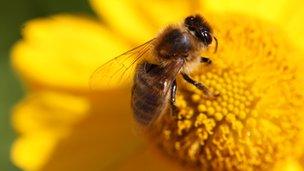Bees in eastern Scotland have lower survival rate, researchers say
- Published

Researchers found honey bee survival rates were much lower in the east of Scotland than the west
University of Dundee researchers have warned of a "striking" difference in honey bee survival rates between the east and west of Scotland.
Scientists studied more than 600 colonies across the country over 12 months.
Of 274 colonies examined in the east of the country, 58, or 21%, failed, while only 14 of 286 colonies failed in the west, a decline of about 5%.
The team has called for greater action to help protect the species.
Their study was carried out with the help of the Scottish Beekeepers Association
The scientists believe the presence of intensive agriculture and large areas of oilseed rape in the east could be linked to the poorer results for the area.
However, they criticised the way data on pesticide use is gathered - or not gathered - saying the current system makes it impossible to properly determine what is causing honey bees to die.
'Fantastic lead'
Dr Christopher Connolly, who led the research, was stunned by the findings.
"It's a fantastic lead," he said. "If only we knew what was being used in those places.
"What we do have in the east and not the west is intensive agriculture. It could be that the lack of natural habitat is the cause. It may be that bees and other pollinators may not be getting such a balanced diet.
"In the west, it's largely wild crops that they are feeding on, such as trees, heather and gorse. It could be that the intensive agriculture and intensive levels of pesticides are contributing to the failure of the bees."
Anecdotal evidence also suggests that similar "devastating" losses were experienced the previous year.
Dr Connolly believes that nicotine-based pesticides, neonicotinoids, may be contributing to the deaths of bees feeding on oilseed rape.
Oilseed rape
It is more commonly grown on the east of Scotland and is used by some beekeepers to rapidly "feed up" their insects in preparation for winter.
"All oilseed rape is treated with neonicotinoids, you can't buy it without it being pre-treated with neonicotinoids," said Dr Connolly.
"Indeed, recent scientific studies have supported a risk from the neonicotinoid pesticides.
"However, there are hundreds of pesticides being used routinely. What would be really valuable is if we could correlate the places where the bee losses are being observed (with pesticide use)."
Dr Connolly is demanding the centralised recording of data so that the "multiple threats" to bees can be analysed properly.
The Scottish government last year launched a survey into the health of the country's bees.
Environment minister Paul Wheelhouse said: "Bees have a vital role to play in our ecosystem, not just because they produce honey and other products but because of their valuable contribution to the pollination of many crops and wild plants.
"That's why it's important that we monitor bee health and ensure our bees stay healthy."
- Published8 February 2013
- Published31 January 2013
- Published28 December 2012
- Published22 June 2010